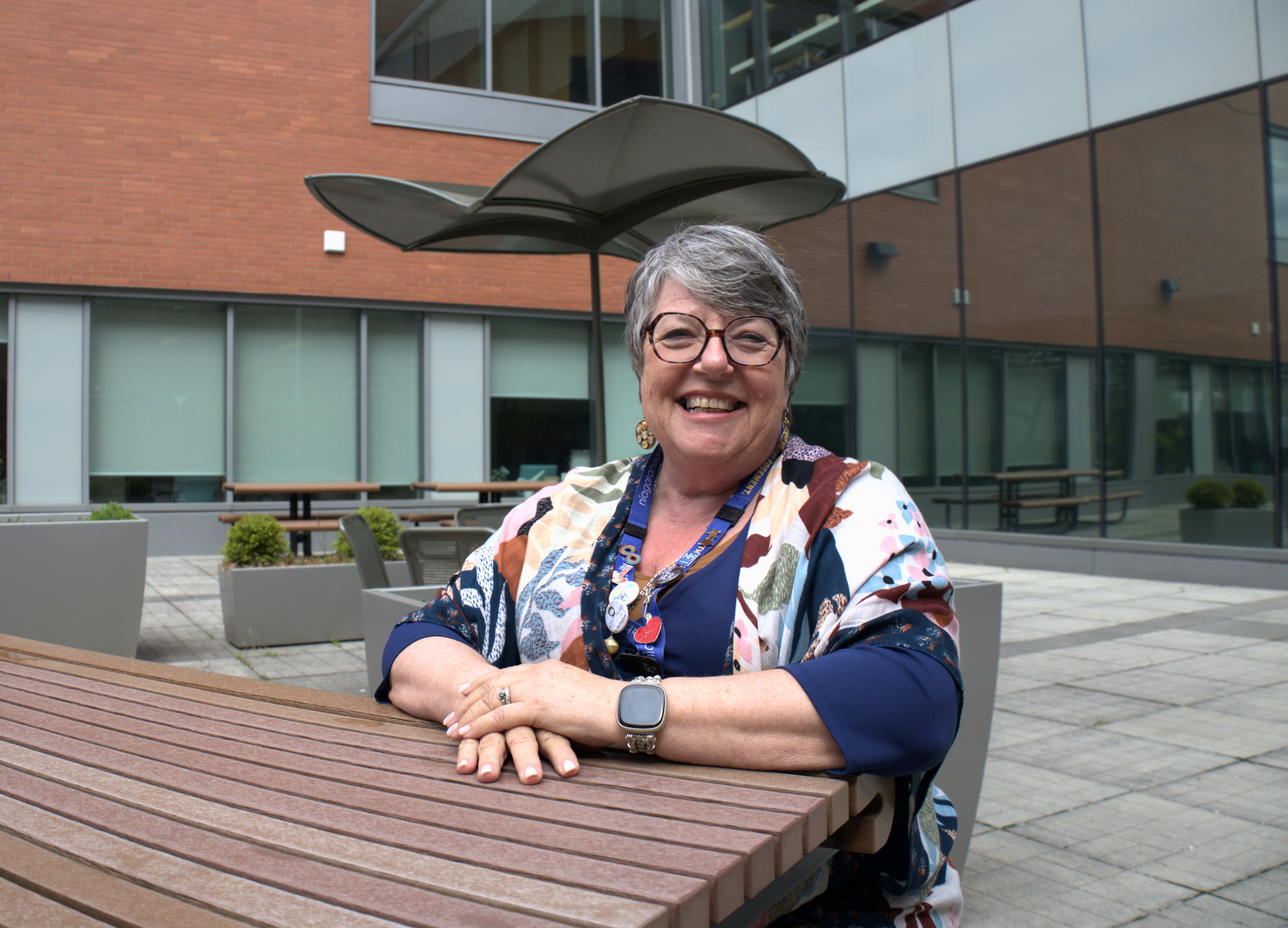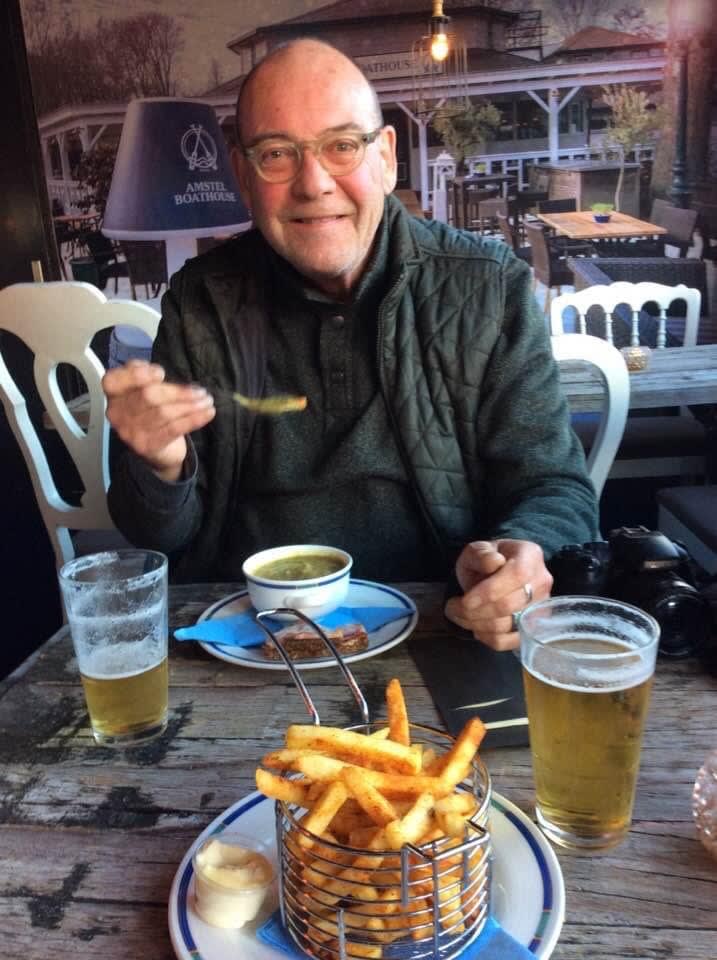This is an opinion column by Niagara Health Communications Specialist Micaela Grant, published in the St. Catharines Standard, Niagara Falls Review and Welland Tribune.

Chaplain and Spiritual Care Practitioner Trish Heidebrecht-Archibald draws on personal experience to support patients and families navigating end-of-life choices, including Medical Assistance in Dying (MAiD), at Niagara Health.
It’s common to schedule the day a baby is born — through induction or planned Caesarean section. But choosing the day to die? That is far more complex.
For Trish Heidebrecht-Archibald, this question is more than theoretical. In her role as a Chaplain and Spiritual Care Practitioner at Niagara Health, she helps patients and families navigate the spiritual and emotional weight of end-of-life decisions — including those involving Medical Assistance in Dying (MAiD).
In 2021, that professional calling became deeply personal.
That spring, her husband John Archibald was diagnosed with stage 4 esophageal cancer. After just one round of chemotherapy, he told her he wanted to pursue MAiD.
“John was quiet, fiercely intelligent and always beat to his own drum — in life and in death,” she says.
He died that June.
Heidebrecht-Archibald had supported MAiD patients for five years before her husband’s diagnosis. But being on the other side of the process gave her a new perspective — and a new depth of empathy.
“Professionally, I knew the steps. But personally, it took time for my heart to catch up with my head,” she says. “I wish I had talked with him more about his decision. There are things I carry now that I try to hold gently.”
MAiD was legalized in Canada in 2016. That same year, Niagara Health supported one of Ontario’s first patient to access MAiD. Since then, patients have continued to purse the option — but the stigma lingers.
“In 2021, MAiD was still whispered about. Some people thought it was giving up or saw it as suicide,” says Heidebrecht-Archibald. “That’s not what it is. It’s about autonomy, relief from suffering and reclaiming one’s dignity.”
That stigma often shows up in subtle, emotional ways — particularly for partners and families left behind. Heidebrecht-Archibald hears it regularly in her role.
“Sometimes people will say, ‘I just don’t want to lose them,’” she says.
“That’s not disagreement. That’s grief. That’s love.”
Others ask whether their partner’s choice will be judged in the afterlife. Is it a sin? Is it selfish? Does it go against their faith?
“These are real fears and they deserve real, compassionate responses,” says Heidebrecht-Archibald. “Can MAiD be a faithful response? I believe it can. It’s a space that’s evolving, but one rooted in humanity.”
She likens the support MAiD offers to tools used at the beginning of life.
“An epidural during childbirth eases suffering. So does MAiD. We just don’t talk about them the same way,” she says.
A structured, compassionate process
At Niagara Health, every request for MAiD is handled with care and integrity. A patient’s inquiry begins a thorough review, including two independent assessments to evaluate eligibility, decision-making capacity and the nature of their suffering.
“I’m proud to be part of a hospital that takes every request seriously,” says Heidebrecht-Archibald. “It’s not about checking boxes. It’s about understanding a person’s experience and needs.”

John Archibald chose MAiD in 2021 after a terminal cancer diagnosis — a decision that continues to guide Trish Heidebrecht-Archibald’s work in spiritual care at Niagara Health
She’s quick to push back against the idea that MAiD is a way to ‘free up beds’ or rush someone out of the system.
“Absolutely not. This is not a social solution. It’s a clinical and spiritual one — supported by ethics, compassion and choice.”
Niagara Health has developed a supportive network of physicians, staff and spiritual care providers who guide families through the process. At the same time, those who choose not to participate are respected.
“There’s room for conscience,” says Heidebrecht-Archibald. “But also, for care.”
“At Niagara Health, every MAiD request is approached with the utmost care, compassion and clinical integrity,” says Dr. Kevin Chan, Executive Vice-President; Medical Affairs and Chief of Staff. “We have robust protocols in place to ensure that each case is thoroughly assessed, ethically supported and centered around the individual’s needs and values. Our teams are committed to walking alongside patients and families with respect and dignity throughout the entire process.”
Heidebrecht-Archibald’s own experience with MAiD has changed how she approaches her work. She’s more attuned to the subtle guilt or uncertainty that families sometimes carry — and more prepared to meet them with honesty and presence.
“I understand the ache in a different way now,” she says. “I’ve walked it.”
She sees how a decision for MAiD, while emotional, can be a moment of clarity and even peace for patients and their loved ones.
“For some families, it’s the first time they’ve had a chance to truly say goodbye without a crisis,” she says. “That matters.”
Though MAiD is a legal and clinical process, Heidebrecht-Archibald reminds people that it is also emotional and sacred.
“It’s not just about death. It’s about how someone wants to live their final days — with choice, music, the people they love and, sometimes, with less fear.”
MAiD remains a growing and sometimes controversial topic. But for Heidebrecht-Archibald, that’s exactly why talking about it matters.
“There’s no one right way to grieve and no one right way to die,” she says. “But people deserve to explore their end of life options without shame.
“I don’t tell people what to believe. I meet them where they are and I honour their story.”
For more information about MAiD, read stories and find out more about 1-to-1 peer support, visit maidfamilysupport.ca.

